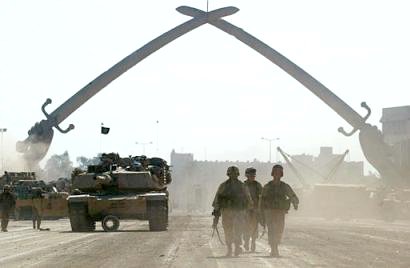"We do feel an obligation to assist in providing security, and coalition forces are doing that," he told a Pentagon news conference. "Where they see looting, they are stopping it." At the war's command center in Qatar, officials said earlier Friday they expected the surge of violence as a release of pent-up hatred and anger at a regime that brutalized and repressed the population for decades. The comments came on the third day of pillaging in the capital, and violence repeated itself anew with the fall of each additional city in northern Iraq. Much of the looting was at government ministries and the homes of former regime leaders, with bands of looters taking everything from vases, desks and other furnishing from government offices to AK-47s and ammunition from Iraqi military bunkers. But they also stripped foreign embassies, took ambulances from hospitals and attacked some private businesses. In the northern city of Mosul, residents burned buildings, stole rare manuscripts from the university library and grabbed wads of money from a bank as local people with accounts deposited there sadly looked on. There was a report of looting at archaeological sites. Rumsfeld suggested that many of the television images beamed around the world showing acts of looting were being shown repeatedly, exaggerating the effect. "You cannot do everything instantaneously" Rumsfeld said, adding there are upcoming efforts to increase security. Retired Army Col. William Taylor called the assertion "dead wrong," saying American forces could do more even though combat continues. "Infantry soldiers can be given the mission of blocking the doors of any facility to keep looters out," said Taylor, now with the Center for Strategic and International Studies. "They don't have to shoot, don't have to beat anybody, but you can darn well use your assault rifle to push them away." Marine commanders in Iraq acknowledged confusion so far in confronting the job. U.S. troops and tanks guarded only a few hotels, key intersections, overpasses and apparently at least one hospital, but a Marine commander said he didn't have enough men to do more. Other soldiers said it was not their job to do police work. The Brookings Institution's Ivo Daalder said it was, since it was U.S. forces that toppled the regime structure that previously provided security, food and so on. "They should be doing something because it destroys our image as the liberators and the people who are going to bring a new order to Iraq," Daalder said. Aid organizations urged the government to quickly get control of the capital, after their representatives in the region reported "the humanitarian situation is worsening as a consequence of widespread lawlessness," said a statement from Washington-based InterAction, a coalition of more than 160 U.S. aid groups. In-country workers for the charity CARE reported that hospitals are "in absolutely dire straits," with some looted and others closed to prevent looting, said the group's spokeswoman in Atlanta, Alina LaBrada. Daalder said he worried that the next step could be a wave of revenge killings against former members of the regime that tortured and killed its political enemies. "We cannot stand by and let that happen," Daalder said. "If there is a tradeoff between providing security and finishing off the war, then it exists for one reason only... we don't have enough troops there." |
